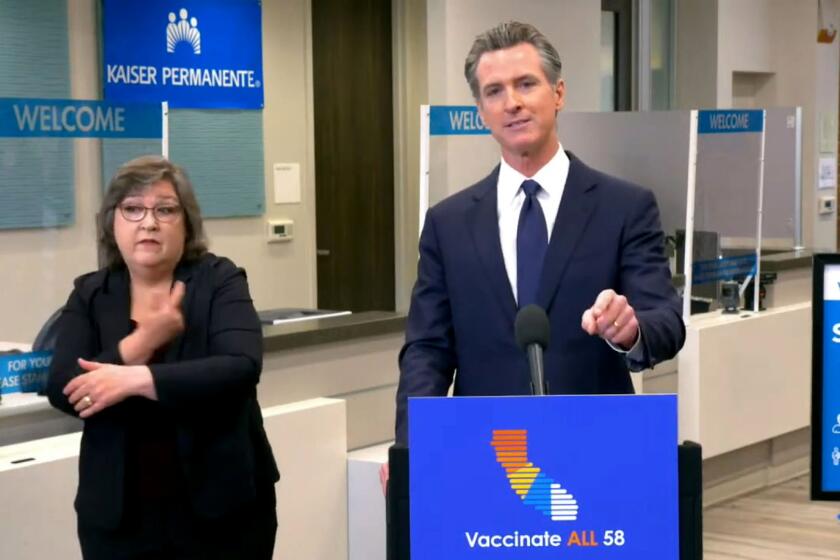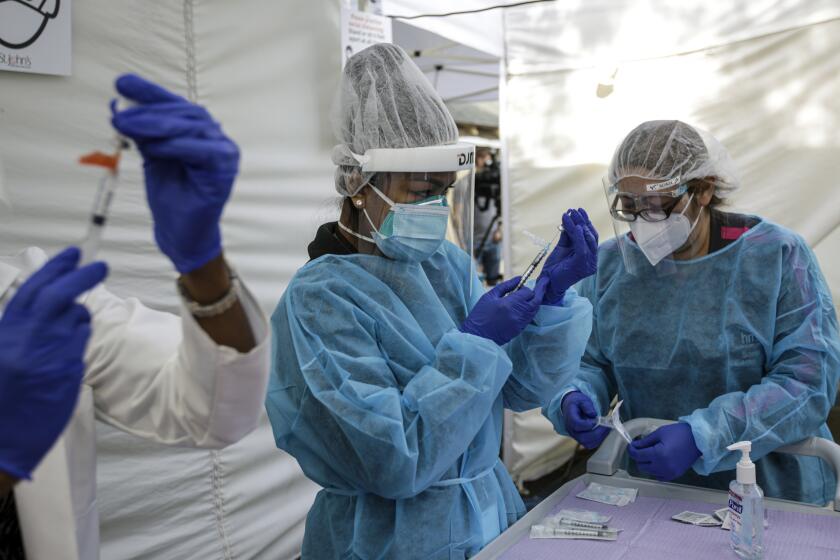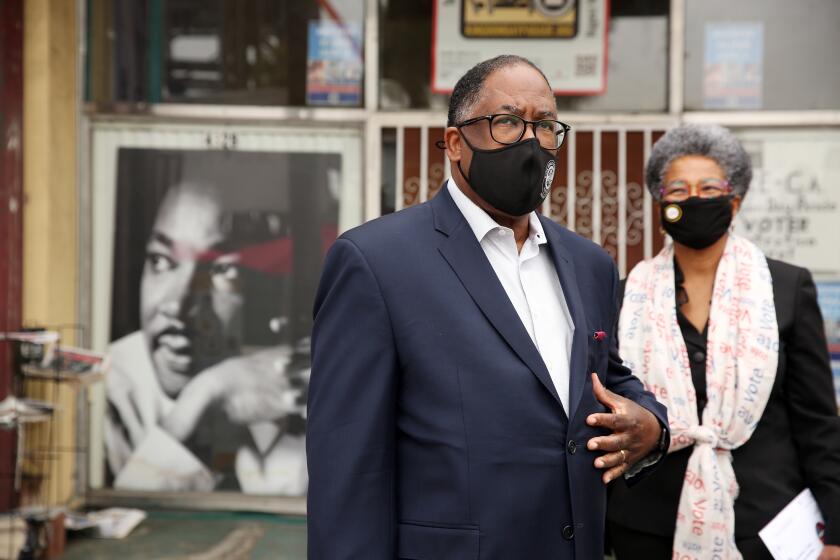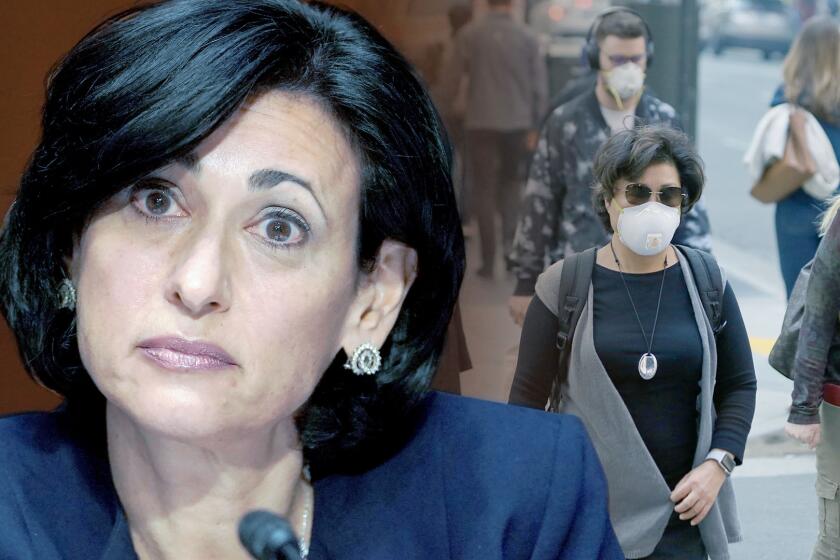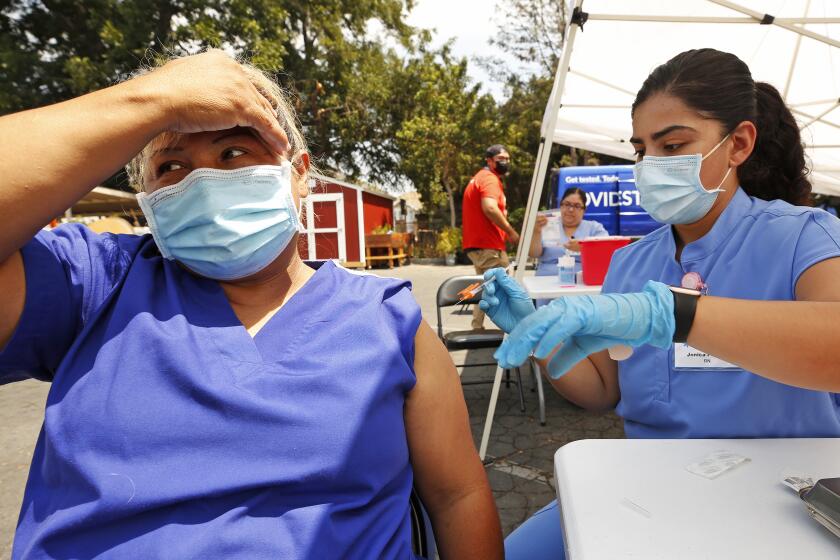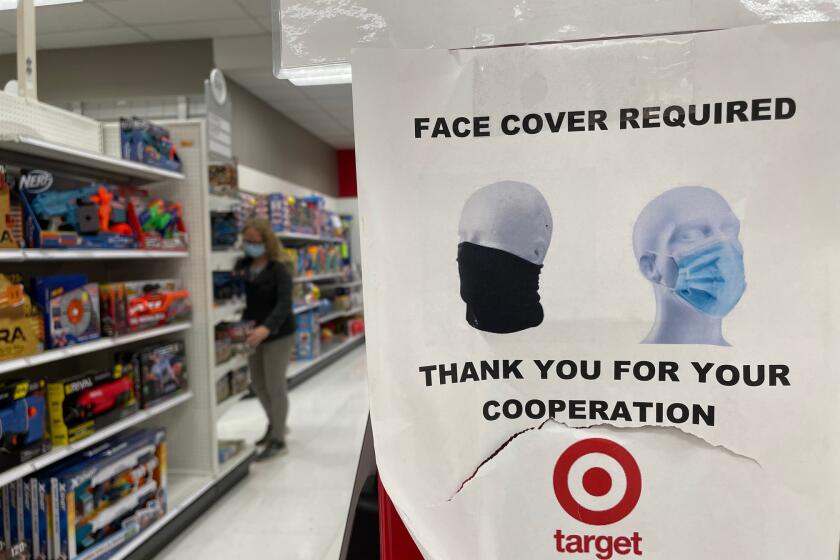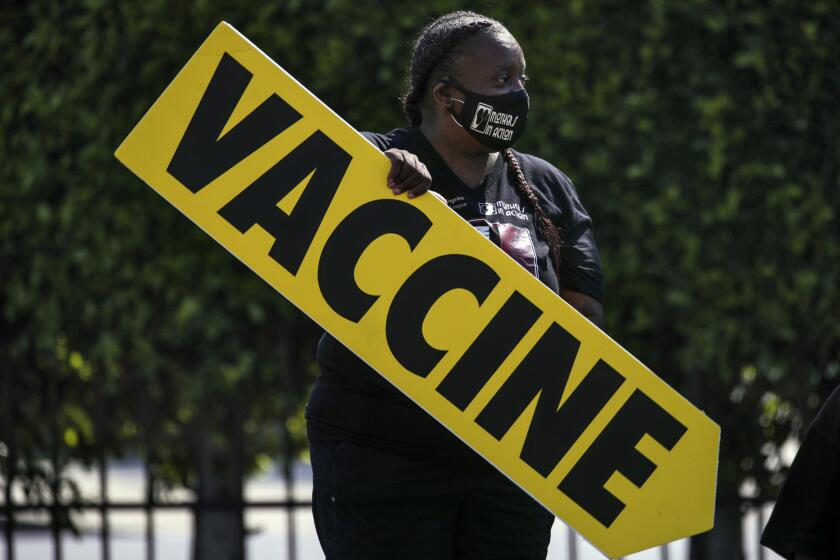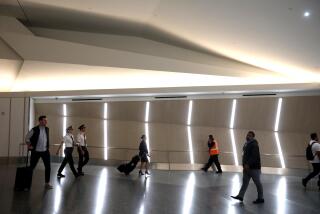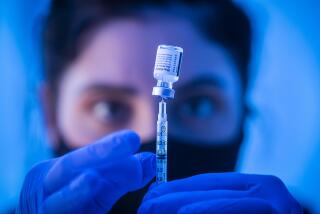Aggressive measures to battle California’s new coronavirus surge: Will they work?
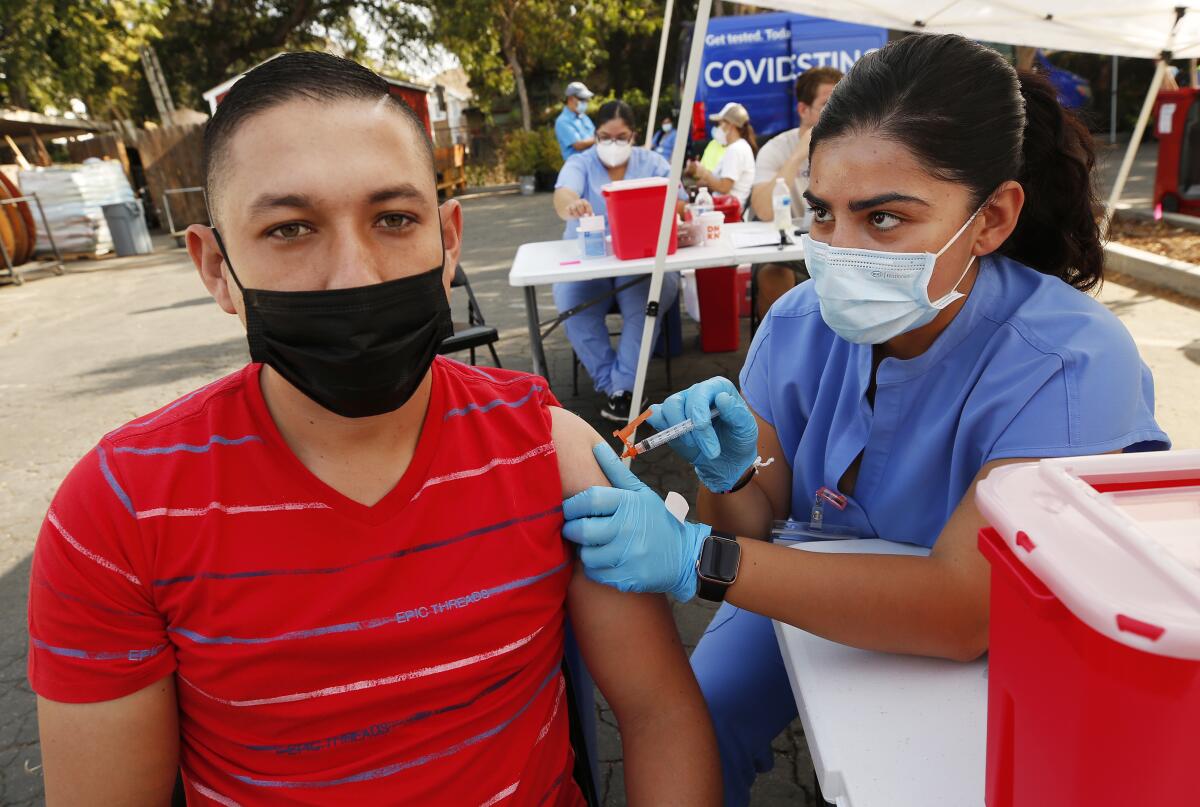
California’s latest coronavirus spike is prompting more action as officials work aggressively to stymie the spread — especially among the unvaccinated, who are most at risk.
With cases and hospitalizations on the rise, the focus is increasingly on pulling out all the stops to ramp up vaccinations and protect as many people as possible against infection and illness — especially with the rapid spread of the highly contagious Delta variant.
That strain, Los Angeles County Public Health Director Barbara Ferrer warned over the weekend, is “one of the most aggressive and infectious respiratory diseases known, and currently makes up over 80% of sequenced cases in L.A. County.”
According to the latest data released by the California Department of Public Health, 82.8% of coronavirus cases that have been analyzed in July have been identified as the Delta variant, up from 52.8% in June.
Experts say those who are fully vaccinated remain well protected against the coronavirus, including the Delta variant. So vaccinations, officials say, are key to fighting the surge.
California government and healthcare employees will soon be required to show proof they’ve been vaccinated against COVID-19 or be tested regularly.
Here are some of the steps being taken:
Proof of vaccination
Those who work for the state of California, or in public or private healthcare settings, soon will be required to show proof they’ve been vaccinated against COVID-19.
If they aren’t vaccinated, or decline to show such documentation, they’ll have to be regularly tested for infection.
The new requirement announced Monday comes as various cities, educational institutions and private businesses are taking similar steps in hopes of curbing the latest resurgence in coronavirus transmission.
When the new policy goes into effect next month, state workers will have to show their vaccine status. Those who are unvaccinated, or decline to show proof, will be tested for coronavirus infection at least once a week and will need to wear masks indoors, according to the California Department of Human Resources.
Similar requirements will be in place for public and private healthcare facilities, as well as congregate settings such as jails, homeless shelters and senior living homes. Any unvaccinated employees also will have to wear appropriate personal protective equipment, such as masks.
California’s new proof-of-vaccination requirement: What you need to know
Requiring vaccines
Although California has, to this point, stopped short of requiring workers to get vaccinated, some government agencies have said they will take that step.
On Monday, the Department of Veterans Affairs became the first major federal agency to require that healthcare workers get a COVID-19 vaccine.
And a growing number of Los Angeles politicians want to require that city workers do likewise.
“It is well past time that we act,” Councilman Mark Ridley-Thomas, whose district stretches from Crenshaw to Koreatown, said Monday.
The pandemic “is not retreating,” Ridley-Thomas said, “and the best defense to date are the vaccinations. So why wouldn’t we do all that we can to avoid the calamity that we were confronted with no more than five months ago?”
Ridley-Thomas said he planned to introduce a motion Wednesday directing city staffers to draw up a policy requiring all city employees to be fully vaccinated against COVID-19.
A growing number of L.A. politicians want to require city workers to get vaccinated against COVID-19 as infection numbers have surged again.
Last week, Pasadena said it would require all city employees to be vaccinated against COVID-19 once the shots received federal approval. The new vaccination requirement came days after about a dozen workers tested positive for the coronavirus and several others were forced to quarantine, city spokesperson Lisa Derderian said.
The city has more than 2,000 employees, and about 60% of them have self-reported being vaccinated, Derderian said.
The vaccination requirement will not go into effect until the U.S. Food and Drug Administration approves at least one of the three vaccines that have been given emergency authorization.
Pasadena is the first Southern California city to issue such a rule; it follows in the steps of San Francisco, which decided last month to issue a similar order for its 35,000 municipal workers.
The University of California system also announced last week it would require vaccines for all students, faculty and others for the fall term.
And outside California, New York City is also going to require city workers to be vaccinated or submit to regular testing.
The CDC recommends that even vaccinated people wear masks indoors in parts of the U.S. where the coronavirus is surging.
The push for more shots
Across L.A. County, officials are hosting community vaccination events to reach stragglers in areas hit hardest by the pandemic. On Friday, about two dozen people turned up for doses at a clinic in Pico-Union. On Saturday morning, Mayor Eric Garcetti joined Ridley-Thomas, L.A. County Supervisor Holly Mitchell and state Sen. Sydney Kamlager (D-Los Angeles) at a community vaccination event in Leimert Park — a neighborhood where 59.5% of people 16 and older have received at least one dose, according to county data.
Racial disparities in vaccination rates remain pronounced countywide. Among Latinos, 55% have received at least one dose, compared with 66% of white residents. In the Black community, that number is 46%.
“Our community, especially Latinos, they need to get in the queue to get vaccinated,” L.A. County Supervisor Hilda Solis said. “I’m very disappointed that we have such low rates of participation in terms of the vaccine.”
Solis also urged county residents to get tested amid rising case numbers.
“There are a lot of people that have the Delta variant and may not know that they are either carriers or that they are experiencing symptoms,” Solis said. “They may think it’s a cold, and that’s why I believe it’s very urgent to be tested.”
Guillermo Cozar waited months to get his vaccine because, he reasoned, he’d already had COVID last fall and didn’t think he would get sick again.
Mask wearing
L.A. County earlier this month required everyone to wear masks in indoor public spaces. Officials hope the requirement will help blunt the latest surge in infections, but it will take time to see if the effort bears fruit.
A number of other California counties are now recommending, though not requiring, that their residents do the same.
The U.S. Centers for Disease Control and Prevention are also reportedly considering changes to urge indoor mask wearing as well. More details are expected to be unveiled Tuesday.
One-third of California counties are now urging even fully vaccinated people to wear masks indoors as coronavirus cases continue to rise.
Precautions urged for the vaccinated, too
There is overwhelming evidence that the COVID-19 vaccinations in use in the United States continue to provide a high degree of protection — although not 100% — against severe illness, hospitalization and death.
Last week, Dr. Anthony Fauci, the U.S. government’s top infectious-diseases expert, cited data showing the Pfizer-BioNTech and Moderna vaccines were 95% and 94% effective, respectively, against symptomatic COVID-19. And in the United States, the single-shot Johnson & Johnson vaccine has been 72% effective against clinically recognizable disease.
“Infections after vaccination are expected. No vaccine is 100% effective,” he said. “However, even if a vaccine does not completely protect against infection, it usually, if it’s successful, protects against serious disease.”
In June, 20% of Los Angeles County’s coronavirus cases were among fully vaccinated residents. But that doesn’t tell the full story.
Nationally, more than 97% of people now hospitalized for COVID-19 have not been vaccinated, according to CDC Director Dr. Rochelle Walensky.
Ferrer last week likened vaccines to wearing a seat belt. “While seat belts don’t prevent every bad thing that can happen during a car accident, they do provide excellent protection — so much so that we all use them routinely. It wouldn’t really make sense to not use a seat belt just because it doesn’t prevent all injuries from car accidents,” she said.
“Rejecting a COVID vaccine because they don’t offer 100% protection,” she went on, “really ignores the powerful benefits.”
People with weak immune systems should still take special care to talk to their doctors about additional protective measures they might want to take.
More to Read
Sign up for Essential California
The most important California stories and recommendations in your inbox every morning.
You may occasionally receive promotional content from the Los Angeles Times.
